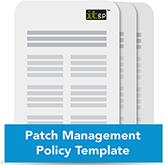
Create a patch management policy in minutes with our easy-to-use, customisable template, which can be tailored to your organisation’s requirements and processes.
Patching is an important part of cyber security. It addresses vulnerabilities in software and operating systems, helping to protect them from exploitation by cyber criminals. Using our Patch Management Policy Template, easily create a policy to ensure that patches are applied regularly and when required, so your systems stay secure.
This template can be used as a Cyber Essentials patch management policy as it supports regular patching of your software and operating systems.
If you are unsure what your patch management policy should include – or where to start – this template will help you create one in minutes, covering all aspects of patch management, including who is responsible for reviewing patches.
With cyber threats constantly evolving, your organisation needs a strategic plan to keep on top of them. Patch management policies help you create and subsequently manage this plan, to ensure vulnerabilities are addressed efficiently and effectively.
Furthermore, by implementing patch management, you are conforming to one of the five basic security controls of the UK government’s Cyber Essentials scheme. Compliance with the scheme provides a range of benefits, including reduced insurance premiums and increased customer confidence and satisfaction.
The most up-to-date documentation that can be accessed anywhere, any time: our expertise, your peace of mind
Standards, regulations and best-practice guidance are constantly changing. Our technical advisors work throughout the year to closely monitor changes that affect your compliance requirements, so that we can ensure you are working from the very latest guidance. With the online DocumentKits platform, you can:
Access to a customisable patch management policy template in our online platform DocumentKits.
If you are thinking about purchasing a template, please click here to review the end-user licence agreement for DocumentKits.